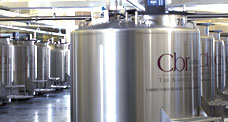Cord Blood Registry® (CBR®) is launching an FDA-regulated clinical trial to investigate autologous stem cell therapy in children diagnosed as having had a prenatal or perinatal pediatric stroke. To be conducted at the Florida Hospital for Children, the Phase 1 trial is the first to examine the use of newborn autologous stem cell therapy in the treatment of pediatric stroke. Following this trial, the goal is to develop Phase 2 studies that will further assess safety and measure efficacy in the use of stem cells to improve common symptoms of this condition.

Cord Blood Registry is headquartered in San Bruno, California. CBR’s owned 80,000 square foot laboratory is located in Tucson, Arizona.
According to the American Stroke Association, a stroke occurs in about one in every 3,500 live births and is one of the leading causes of death in children between ages 1 and 19.[1] Of children surviving a stroke, approximately 60 percent will have permanent neurological deficits, most commonly cerebral palsy and hemiparesis or hemiplegia – total or partial paralysis on one side of the body. Other long-term disabilities caused by a stroke occurring around the time of birth can include epileptic seizures, spasticity and bladder control issues. The risk of a stroke in children is greatest in the first year of life, and peaks during the perinatal period, roughly the weeks before and immediately after birth.1
“There is a critical need for the development of new treatments as the incidence and prevalence of pediatric stroke have increased over time,” said Dr. James Baumgartner, pediatric neurosurgeon and principal investigator of the trial. By supporting this and other trials and investing in the types of regenerative medicine research that hold significant potential to meet the future needs of families, CBR is helping advance newborn stem cell research and therapies.”
Recruitment is underway to enroll 10 children between the ages of 6 weeks and 6 years who have experienced a stroke in utero or immediately after birth, and who have a CBR-processed cord blood unit which was collected at birth. Subjects will first receive a baseline neurologic evaluation which includes brain imaging, evaluation of epilepsy, nerve impulses, and bladder control issues, which will help assess the overall severity of the stroke’s impact prior to treatment. After this evaluation is complete, eligible patients will receive a single autologous stem cell infusion, with follow-up testing to occur after six and 12 months. The hypothesis is that the autologous stem cells will help repair the damage that occurred during the stroke.
Stroke risk factors, symptoms, prevention efforts, and treatment are often different in children than those in adults.1 More research is needed to better understand the unique aspects of diagnosing and treating strokes in children. Families affected by pediatric stroke face numerous challenges when treating the most common symptoms, such as epileptic seizures, spasticity and bladder control issues.
First line treatment for epilepsy includes anticonvulsants, which can be difficult to accurately prescribe and administer to children and breakthrough seizures are still possible even when anticonvulsants are administered. Common side effects such as extreme drowsiness can affect the quality of life for children and their parents. First line treatment for spasticity is physical therapy which not only has variable efficacy but may be difficult to access and may not be covered by insurance for extended timeframes. First line treatment for bladder related issues is catheterization, which can be cumbersome and difficult to manage.
“Our Cerebral Palsy Family Network (CPFN) has been following stem cell research and the impact it can have on children born with cerebral palsy whether it is by in-utero stroke or other brain damage. Because of our extensive reach within the CP community, our families have been asked and have participated in NIH studies including the funding of research projects. These clinical trials are critical to making a better life for children with neurological deficits,” said Janice Godwin, Executive Director of CPFN.
Once the initial 10 children are recruited, infused and evaluated at Florida Hospital for Children, the preliminary results could be available in less than three years. For further details regarding eligibility criteria for the trial, visit:https://www.clinicaltrials.gov/ct2/show/NCT02460484
About Cord Blood Registry
Cord Blood Registry® (CBR®) is the world’s largest newborn stem cell company. Founded in 1992, CBR is entrusted by parents with storing more than 600,000 cord blood and cord tissue units. CBR is dedicated to advancing the clinical application of newborn stem cells by partnering with leading research institutions to conduct FDA-regulated clinical trials, requiring CBR processed cord blood, for conditions that have no cure today. For more information, visit cordblood.com.
About Florida Hospital for Children
The Walt Disney Pavilion at Florida Hospital for Children is a seven-story, 201-bed state-of-the-art facility designed with the help of Walt Disney Imagineers, families and clinicians. Our team of over 135 highly skilled pediatric specialists delivers extraordinary care across more than 35 pediatric subspecialties, including a Children’s Emergency Department, the Level IV Comprehensive Pediatric Epilepsy Center, a world-renowned Pediatric Heart Center and our Level III Neonatal Intensive Care Unit (NICU). With more than 23 pediatric specialty surgeons performing complex operations in a safe and child friendly environment, Florida Hospital for Children is a destination for health and healing. Learn more at FloridaHospitalforChildren.com.
[1] American Stroke Association “FACTS Knowing No Bounds: Stroke in Infants, Children, and Youth.”wcm/@adv/documents/downloadable/ucm_302255.pdf” rel=”nofollow” target=”_blank”>http://www.strokeassociation.org/idc/groups/heart-public/@wcm/@adv/documents/downloadable/ucm_302255.pdf
SOURCE Cord Blood Registry

